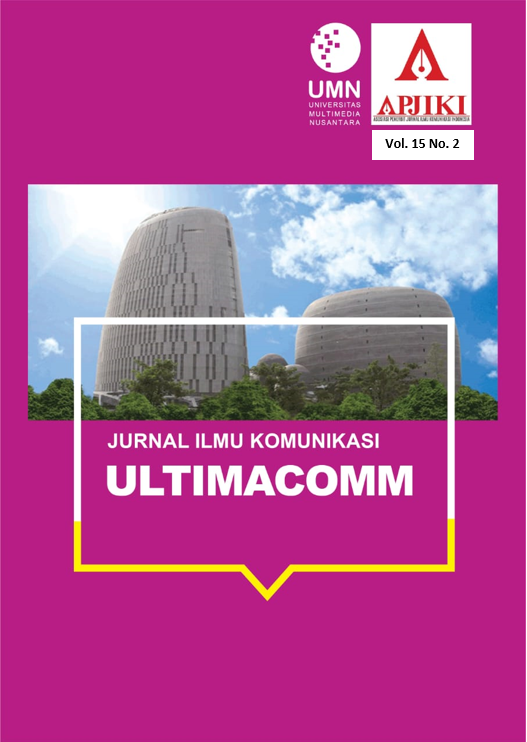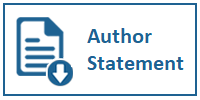Responsive Regulation for Non-platform Media: Challenges and Opportunities in Indonesia
DOI:
https://doi.org/10.31937/ultimacomm.v15i2.3461Keywords:
Digital Journalism; Social Media; Homeless Media; Media Regulation; Freedom of ExpressionAbstract
This research investigates the regulation of non-platform media in Indonesia from a legal perspective. Non-platform media, such as social media, blogs, and personal websites, have become influential communication tools in modern society. The study explores various relevant aspects, including freedom of speech, inequality in access, ethics, international cooperation, and the role of the government. The research employs a qualitative approach, allowing for a deep understanding of the non-platform media phenomenon. The literature review is used to construct a framework of relevant theories and concepts related to the research topic and to identify current research trends in the context of non-platform media. The objective of this research is to comprehend how the Indonesian government regulates non-platform media with the existing rules and regulations and its impact on the media industry and the public. Using a qualitative approach, this research aims to provide in-depth insights into the complex debate surrounding the regulation of non-platform media in Indonesia and how these regulations can achieve a balance between freedom of speech and the protection of the public.
Downloads
References
Ariestyani, K. (2019). Meninjau Automated Journalism: Tantangan dan Peluang di Industri Media di Indonesia. Konvergensi"¯: Jurnal Ilmiah Ilmu Komunikasi, 1(1), 51–65. https://journal.paramadina.ac.id/index.php/IK/article/view/254
Bennett, A., & Royle, N. (2023). An Introduction To Literature, Criticism and Theory. . Taylor & Francis.
Besman, A., & Santoso, M. B. (2017). Ethics Protection Against Children In Kompas TV News Editorial. Dharma Duta Faculty International Seminar on Communication, Tourism, Culture, Law and Social Science, 223–228.
Bintari, N. (2016). 3 Komponen Utama dalam Konsep Homeless Media. https://mix.co.id/marcomm/news-trend/3-komponen-utama-dalam-konsep-homeless-media/
Brown, R. L. (2015). The Harm Principle and Free Speech. Southern California Law Review, 89. https://heinonline.org/HOL/Page?handle=hein.journals/scal89&id=1009&div=&collection=
Creswell, J. W. (2002). Educational Research: Planning, Conducting, and Evaluating Quantitative and Qualitative Research. Merrill Prentice Hall.
Dewan Pers. (2023). https://dewanpers.or.id/publikasi/pengumuman_detail/605/Rancangan_Peraturan_Presiden_(RPerpres)_dari_Dewan_Pers_dan_Konstituen_tentang:_%E2%80%9CTanggung_Jawab_Perusahaan_Platform_Digital_untuk_Mendukung_Jurnalisme_Berkualitas%E2%80%9D
Donnelly, J. (1999). Human Rights, Democracy, and Development. In Source: Human Rights Quarterly (Vol. 21, Issue 3).
Fahlevi, M., Saparudin, M., Maemunah, S., Irma, D., & Ekhsan, M. (2019). Cybercrime Business Digital in Indonesia. E3S Web of Conferences, 125, 21001. https://doi.org/10.1051/E3SCONF/201912521001
Fahruddin, A. (2021). Etika Komunikasi Pejabat Publik dalam Penanganan Pandemi Covid-19. El Madani: Jurnal Dakwah Dan Komunikasi Islam, 2(02), 121–144. https://doi.org/10.53678/elmadani.v2i02.290
Fuchs, C. (2013). Critique of the political economy of web 2.0 surveillance. Internet and Surveillance: The Challenges of Web 2.0 and Social Media, 31–70. https://doi.org/10.4324/9780203806432
Junaedi, D., Supriyatna, R. K., & Arsyad, M. R. (2023). Era Baru Perkembangan Peradaban Ekonomi Digital. Sci-Tech Journal, 2(1), 32–46.
Kamala, H., & Fandana, R. (2016). Perlindungan Hak Asasi Manusia. https://doi.org/10.31219/OSF.IO/7ATZ6
Krisnawati, D. (2018). Peran Perkembangan Teknologi Digital Pada Strategi Pemasaran dan Jalur Distribusi UMKM di Indonesia. Jurnal Manajemen Bisnis Krisnadwipayana, 6(1), 69-74.
Kurnia, T. S. (2016). Mahkamah Konstitusi dan Hak Untuk Bebas Dari Perlakuan Diskriminasi. Jurnal Konstitusi, 12(1), 21. https://doi.org/10.31078/jk1212
Lestari, Y. S. (2018). Politik Identitas di Indonesia: Antara Nasionalisme dan Agama. Journal of Politics and Policy, 1(1), 19–30.
Maddox, J., & Malson, J. (2020). Guidelines Without Lines, Communities Without Borders: The Marketplace of Ideas and Digital Manifest Destiny in Social Media Platform Policies. Social Media and Society, 6(2). https://doi.org/10.1177/2056305120926622
Marconi, F. (2015). The Rise of "Homeless” Media. https://fpmarconi.medium.com/the-rise-of-homeless-media-97e031c8b319
Nurochman, A., Supriyanto, W., Fakultas Perikanan dan Ilmu Kelautan, P., Jenderal Soedirman, U., Perpustakaan, U., Gadjah Mada, U., Soparno, J., GOR Soesilo Soedarman Karangwangkal Purwokerto, K., & Bulak Sumur, J. (2022). RELASI PERPUSTAKAAN DIGITAL DAN MEDIA SOSIAL SEBAGAI SUMBER PENGETAHUAN MASYARAKAT MARJINAL. Buletin Perpustakaan, 5(2), 233–246. https://doi.org/10.20885/BPUII.25170
Quinn, R., & Levine, J. (2014). Intellectual-HRDs and Claims for Academic Freedom Under Human Rights Law. The International Journal of Human Rights, 18, 898–920. https://doi.org/10.1080/13642987.2014.976203
Radsch, C. C. (2023). Platformization and Media Capture: A Framework for Regulatory Analysis of Media-Related Platform Regulations. UCLA Journal of Law and Technology, 28. https://heinonline.org/HOL/Page?handle=hein.journals/ujlt28&id=186&div=&collection=
Rajab, A. (2018). Urgensi Undang-Undang Nomor 19 Tahun 2016 Tentang Perubahan Atas Undang-Undang Nomor 11 Tahun 2008 Tentang Informasi dan Transaksi Elektronik Sebagai Solusi Guna Membangun Etika Bagi Pengguna Media. Jurnal Legislasi Indonesia, 14(4), 463–471.
Rizki, M. J. (2023). Dewan Pers Jelaskan Rencana Platform Digital Wajib Bayar Konten Berita. Hukumonline.Com. https://www.hukumonline.com/berita/a/dewan-pers-jelaskan-rencana-platform-digital-wajib-bayar-konten-berita-lt6183b9213c69b/
Rumata, V. M. (2017). Perilaku Pemenuhan dan Penyebaran Informasi Publik Bagi Masyarakat Kota dan Desa. Jurnal Penelitian Komunikasi, 20(1), 91–106. https://doi.org/10.20422/jpk.v20i1.146
Rumlus, M. H., & Hartadi, H. (2020). Kebijakan Penanggulangan Pencurian Data Pribadi dalam Media Elektronik. Jurnal HAM, 11(2), 285. https://doi.org/10.30641/ham.2020.11.285-299
Sandi, M. R., Herawati, M., & Adiprasetio, J. (2022). Framing Media Online Detik. com Terhadap Pemberitaan Korban Pengeroyokan oleh Bobotoh. Jurnal Kajian Jurnalisme, 5(2), 145-159.
Sinaga, T. M. (2023). Pers Menanti Regulasi ”Publisher Rights” - Kompas.id. Kompas.Id. https://www.kompas.id/baca/humaniora/2023/07/12/regulasi-publisher-rights-dinanti
Siriyuvasak, U. (2005). People's Media and Communication Rights in Indonesia and the Philippines. Inter-Asia Cultural Studies, 6(2), 245–263. https://doi.org/10.1080/14649370500104711
Thomas, W. W. (2015). Pelanggaran Kode Etik Jurnalistik Dalam Berita Kampanye Pemilihan Umum Calon Kepala Daerah Jawa Timur Periode 2014-2019 di TVRI Jawa Timur. Jurnal E-Komunikasi, 3(1), 1–12. http://studentjournal.petra.ac.id/index.php/ilmu-komunikasi/article/view/3837/3535
Vese, D. (2022). Governing Fake News: The Regulation of Social Media and the Right to Freedom of Expression in the Era of Emergency. European Journal of Risk Regulation, 13(3), 477–513. https://doi.org/10.1017/ERR.2021.48
Wahyuni, H. I. (2007). Politik Media dalam Transisi Politik: Dari Kontrol Negara Menuju Self-Regulation Mechanism,. Jurnal Ilmu Komunikasi, 4(1).
Downloads
Published
How to Cite
Issue
Section
License
Ultimacomm Jurnal Ilmu Komunikasi allows readers to read, download, copy, distribute, print, search, or link to its articles' full texts and allows readers to use them for any other lawful purpose. The journal allows the author(s) to hold the copyright without restrictions. Finally, the journal allows the author(s) to retain publishing rights without restrictions
1. Authors are allowed to archive their submitted article in an open access repository
2. Authors are allowed to archive the final published article in an open access repository with an acknowledgment of its initial publication in this journal















